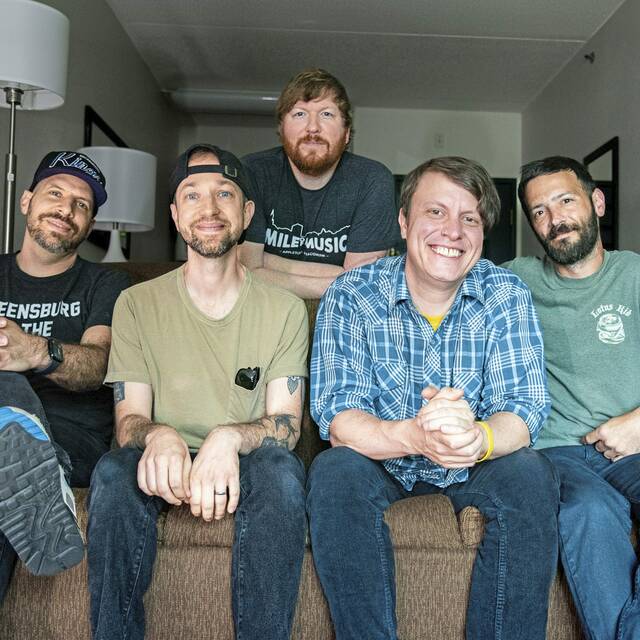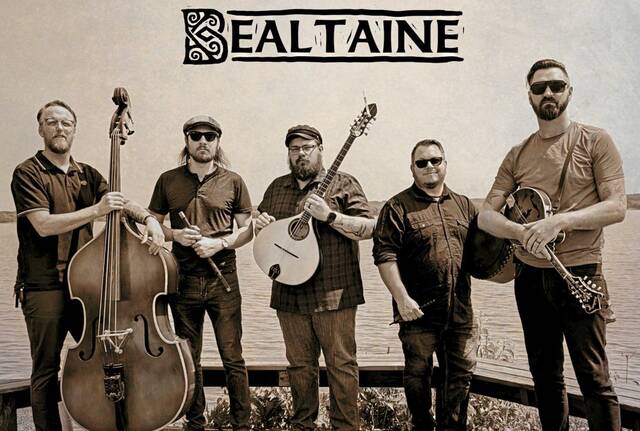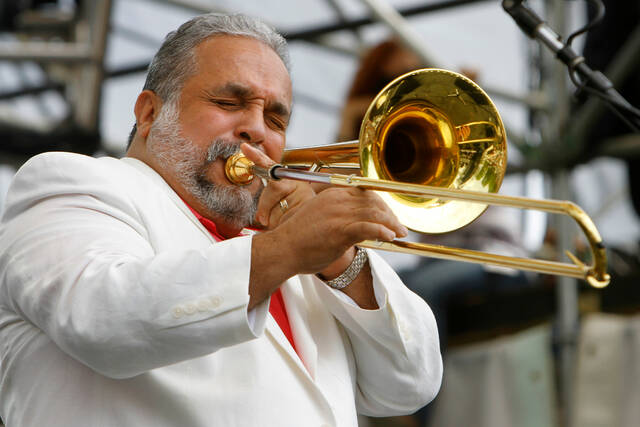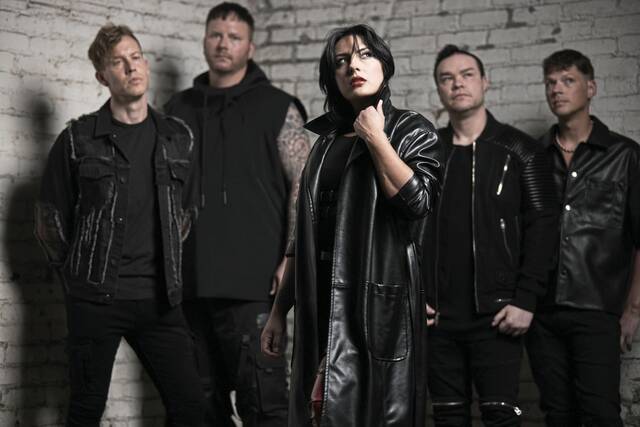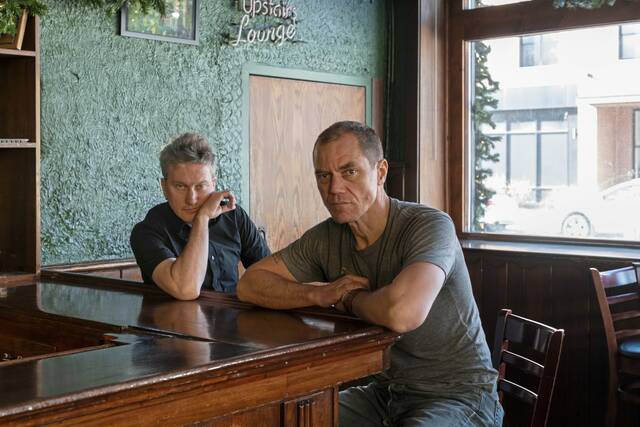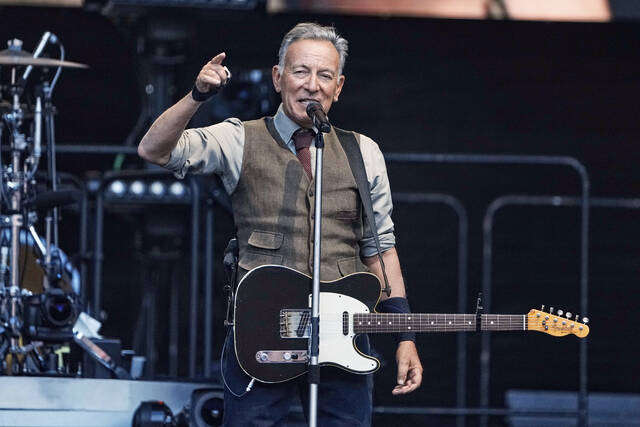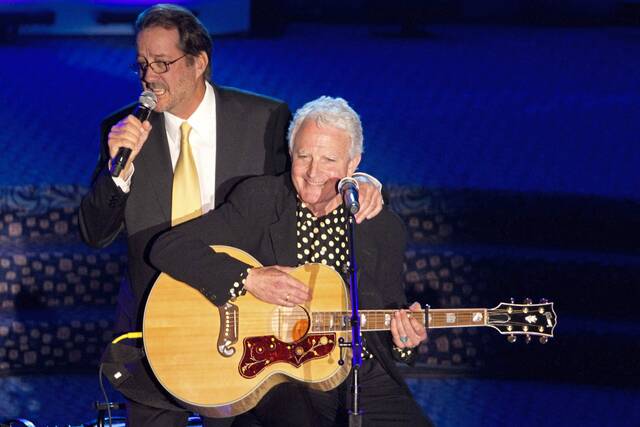In a full-circle moment, Punchline will celebrate the 20th anniversary of their “Action” album with a show at the Roxian Theatre on next Saturday, less than a mile from the band’s McKees Rocks practice space where the album was written.
The veteran Pittsburgh pop-punk band’s show will feature the full original band lineup, with original guitarist Paul Menotiades rejoining permanently and drummer PJ Caruso joining temporarily. The show, which includes Hot Rod Circuit, Eternal Boy and Heading North, will also see special “Action”-themed beer from Dancing Gnome and a live-show variant of the “Action” vinyl reissue.
After a couple of Northeast and Midwest shows earlier this year celebrating the album, Punchline purposefully saved their hometown show for last, according to bassist Chris Fafalios.
“All of these shows have been so good because it’s brought people out who we hadn’t seen in a while,” he said Wednesday. “We never stopped being a band and releasing albums, but I think this one hit a lot of people in the nostalgia feels.”
The “Action” album, released in 2004 via Fueled by Ramen, is full of catchy pop-punk, laced with angsty yet lighthearted lyrics from Punchline, which also includes guitarist/singer Steve Soboslai and guitarist Trevor Leonard.
“We were a young band, and I think this album really captured that moment in time, both on an emotional level and just in an energy,” Fafalios said. “There’s a lot of energy that kind of pops off the record. … You have the upbeat, get-your-heart-racing-type songs, but you also have the really emotional sort of ballads on this one. So I think it really encapsulates not only that era, that 2004 era, but also I think kind of gets people in their feels a little bit. It’s the combination of those things.”
In a call from Greensburg, Fafalios also delved more into “Action,” the logistics of the band now and a surprise cover by Fall Out Boy at PPG Paints Arena:
Do the songs still evoke the same emotions for you now that they did 20 years earlier?
It’s funny. We’ve been doing this documentary podcast called “A Band Called Punchline,” where each episode is a different album. On the “Action” episode, Steve from our band talked about this. I thought this was a pretty poignant thing that he said: A lot of the songs are about certain things or certain people, and it’s almost like when you play the songs now, you don’t think about the things or people that you wrote the song about. Those almost become secondary, and what comes forefront to your mind is just the experience of being in a practice space and writing these songs with your friends, and then those songs taking you all over the place to play them and then the connection you have with the people that are singing them back to you. … The songs still do resonate with us but just in a way cooler way, if that makes sense.
Is it hard to get the band together for shows? Is there a lot of scheduling to get that done?
We’re all pretty easy-going as far as scheduling goes. We all have some commitments, but this becomes No. 1 priority for everyone when we have shows or any tours or even short runs. It’s just been a priority for us for — seriously, I figured out the percentage recently, definitely for Steve and I who have both been in the band the entire time — the almost 28 years now or whatever, and I’ve been in this band for like 65% of my life now. It would be impossible to not make this a priority. Once in a while, we got to decide what night of the week or whatever, but we usually practice two nights a week. We know that that’s happening. And what’s pretty awesome is, now with the technology and everything, that we can track our practices. And if you want to practice at home, you can literally take out your own tracks, take out your vocals and your instrument and play along as if you’re playing with your band. So if you want to get extra practices in, like our drummer does, he’ll take out his drums and it’s like he’s playing with us at practice. So that helps with things too a little bit. If we were in a jam and we couldn’t get together that week for some reason, then we’d still be good.
If you’re still doing all these practices, it’s probably not that difficult to knock off the rust?
I feel like if we haven’t practiced for a month or something, like sometimes maybe it takes a few songs to get into it, but especially these songs that we’re playing now, these are all muscle memory at this point. And it’s almost like when we get together to practice these “Action” songs that we’ve been playing forever, it’s more just thinking about the show, trying to really dial things in, maybe adding little flourishes and stuff. I could not play these songs for five years and pick up my bass and my fingers just know where to go without even thinking about it. We all said that. It’s almost like magic, the way that I could not play these songs for a year, and I wouldn’t miss a note just because they’re so ingrained into my brain at this point.
Related
• Fall Out Boy delivers arena-sized emo spectacle in Pittsburgh show• Bayside singer Anthony Raneri on the punk band's new album, unusual release cycle and songwriting styles
• 2024 Pittsburgh area concert calendar
At the Fall Out Boy show earlier this year, they did a cover of “Heart Transplant,” so how cool was that to hear?
I wish they would have gave — that’s what we all said — I wish they would have gave us a heads up they were gonna do that, and we would have been there. (laughs) I feel bad that I wasn’t there. I feel like it was like a weeknight, and it was at the arena — which, look, I like going to concerts but sometimes arena shows, it just feels impersonal or something, so I didn’t end up going. Then all of a sudden my phone started blowing up. I swear I got like 20 text messages and Instagram DMs and stuff of people like, what is going on? It was just all these videos of that happening. And yeah, it’s super cool.
Just this year — I forget what it was on — but I was listening to something where Pete Wentz talked about how we took them on their first tour. We signed to the same record label at the same time, we went to Japan together for the first time together and then as things started really catching on for them, we did a tour with them where we were like, whoa! Things have really blown up for them at that point and then it went and went, and then over the years we lost touch with them … Sometimes I wonder because we were really good friends with those guys and then I feel like we got to a certain point where so much was going on with them, where we were like, I don’t want to bother them or make it seem like we’re trying to get something from them. That’s just like our personality to be like that. (laughs) I don’t know if it’s like a Pittsburgh thing. It felt like they got so much going on or whatever and lost touch, and sometimes I’m like ah, maybe we should have called them once in a while or been like, hey, can we open this tour or something? But after that happened, Steve reached out to Patrick (Stump, Fall Out Boy’s singer), and we’ve been talking a little bit. That was super cool. I wasn’t expecting that but, yeah, it’s pretty awesome all the success they were able to have. It’s pretty cool to see your buds make it.
It sounds like Punchline made some lasting impressions. I talked to Anthony (Raneri) from Bayside earlier this year and he mentioned you guys, so it sounds like these connections are always going to be there.
Especially that era of this album we’re talking about, there was like a five-year span where we were touring pretty much full-time and made a lot of lifelong friends, and a lot of bands that we toured with went on to become some of the biggest bands in our world of music. I always like it when the bands that were out there paying their dues, Bayside is the perfect example. Man, we played every hole-in-the-wall, VFW, fire hall, whatever it was, in all the small weird towns together with those guys back in the day. And then you see as things start to pick up, it’s just cool to see that. We experienced it, and bands experience it on even a larger level than we have of going from some kids setting up a show at some sort of building in this small town to then being able to play all the “A” market cities and a nice venue and it’s just a lot more comfortable. I’m always of the belief that you should have to do that. You should have to play all those weird, bad shows so you appreciate what you have when you can play a beautiful venue like the Roxian or something. You just appreciate it that much more when a lot of people come out and see you and sing along and maybe the venue feeds you and stuff. That’s always pretty nice.


